

Bruner - Learning Theory in Education. By Saul McLeod published 2008,updated The outcome of cognitive development is thinking.
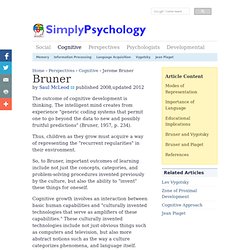
The intelligent mind creates from experience "generic coding systems that permit one to go beyond the data to new and possibly fruitful predictions" (Bruner, 1957, p. 234). Thus, children as they grow must acquire a way of representing the "recurrent regularities" in their environment. So, to Bruner, important outcomes of learning include not just the concepts, categories, and problem-solving procedures invented previously by the culture, but also the ability to "invent" these things for oneself. Cognitive growth involves an interaction between basic human capabilities and "culturally invented technologies that serve as amplifiers of these capabilities.
" The aim of education should be to create autonomous learners (i.e., learning to learn). Cognitive Theory. By By Saul McLeod 2009, updated 2015 Piaget's (1936) theory of cognitive development explains how a child constructs a mental model of the world.
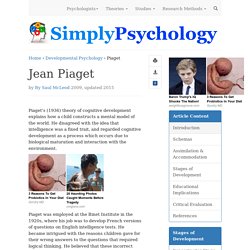
He disagreed with the idea that intelligence was a fixed trait, and regarded cognitive development as a process which occurs due to biological maturation and interaction with the environment. Piaget was employed at the Binet Institute in the 1920s, where his job was to develop French versions of questions on English intelligence tests. He became intrigued with the reasons children gave for their wrong answers to the questions that required logical thinking. He believed that these incorrect answers revealed important differences between the thinking of adults and children.
Piaget (1936) described his work as genetic epistemology (i.e. the origins of thinking). What Piaget wanted to do was not to measure how well children could count, spell or solve problems as a way of grading their I.Q. Piaget's Theory Differs From Others In Several Ways: Schemas. List of books and articles about Cognitive Learning. Learning, in psychology, the process by which a relatively lasting change in potential behavior occurs as a result of practice or experience.
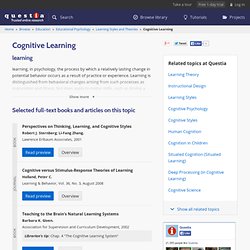
Learning is distinguished from behavioral changes arising from such processes as maturation and illness, but does apply to motor skills, such as driving a car, to intellectual skills, such as reading, and to attitudes and values, such as prejudice. There is evidence that neurotic symptoms and patterns of mental illness are also learned behavior. Learning occurs throughout life in animals, and learned behavior accounts for a large proportion of all behavior in the higher animals, especially in humans. Models of Learning The scientific investigation of the learning process was begun at the end of the 19th cent. by Ivan Pavlov in Russia and Edward Thorndike in the United States. Classical Conditioning The first model, classical conditioning, was initially identified by Pavlov in the salivation reflex of dogs.
Operant Conditioning. Stage Theory of Cognitive Development (Piaget. Summary: Piaget’s Stage Theory of Cognitive Development is a description of cognitive development as four distinct stages in children: sensorimotor, preoperational, concrete, and formal.
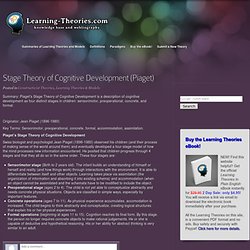
Originator: Jean Piaget (1896-1980) Key Terms: Sensorimotor, preoperational, concrete, formal, accommodation, assimilation. Piaget’s Stage Theory of Cognitive Development Swiss biologist and psychologist Jean Piaget (1896-1980) observed his children (and their process of making sense of the world around them) and eventually developed a four-stage model of how the mind processes new information encountered. He posited that children progress through 4 stages and that they all do so in the same order. Sensorimotor stage (Birth to 2 years old). Cognitive Learning Theory - Using Thinking to Learn. Using Thinking to Learn The Cognitive Learning Theory explains why the brain is the most incredible network of information processing and interpretation in the body as we learn things.
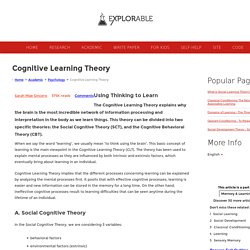
This theory can be divided into two specific theories: the Social Cognitive Theory (SCT), and the Cognitive Behavioral Theory (CBT). This article is a part of the guide: Discover 30 more articles on this topic Browse Full Outline When we say the word “learning”, we usually mean “to think using the brain”. Cognitive Learning Theory implies that the different processes concerning learning can be explained by analyzing the mental processes first. A. In the Social Cognitive Theory, we are considering 3 variables: behavioral factors environmental factors (extrinsic) personal factors (intrinsic) These 3 variables in Social Cognitive Theory are said to be interrelated with each other, causing learning to occur.
Basic Concepts B.